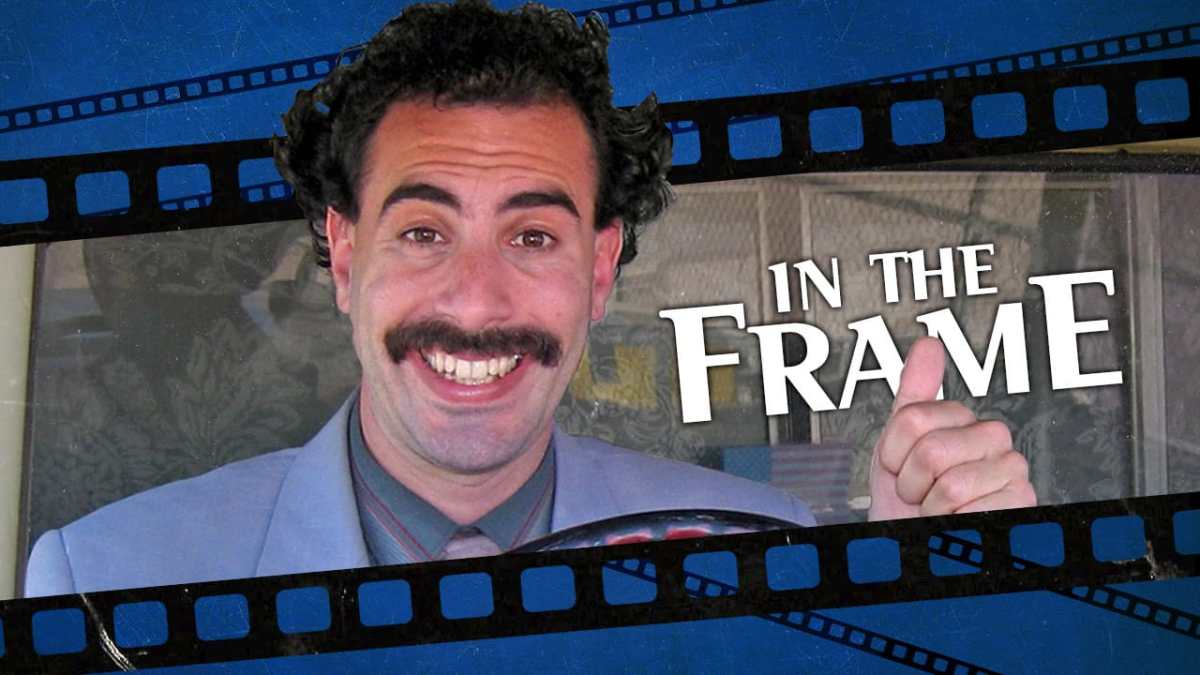It is interesting how much the world can change in 14 years.
Sacha Baron Cohen invented the character of the Kazakh news reporter Borat Sagdiyev for Da Ali G Show, but the caricature really rose to prominence with the release of Borat in 2006. The film was largely structured around Baron Cohen’s knack for improvised prank comedy, approaching both celebrities and ordinary people in character in order to generate humor; some of the comedy derived from the surreality of the interaction, the rest drawn from what Borat managed to draw out from them.
Borat was released in the middle of President George W. Bush’s second term, as the War on Terror raged. While there were reports that racism and hate crimes against the Muslim community were on the rise and anxiety within the community, President Bush had taken pains to support that community. The political and social climate was not as overtly fraught as it would become. The United States was two years away from electing Barack Obama, its first black president. It was a different time.
Borat remains a controversial and polarizing character. Although he would later make his peace with the fictional journalist, critic Bilge Ebiri admits that he “broke out in hives” when he recognized Borat as “an imaginary Pan-Balkan–Central Asian–Middle Eastern other who embodied the prejudices and retrograde beliefs the West often unfairly ascribed to those cultures.” However, as Peter Tatchell points out, the sequences built around Borat in the first film are typically “complex, ambiguous, and often subversive.”
Baron Cohen argues his comedy exists not to perpetuate prejudice, but to expose it. “I think the joke is on people who can believe that the Kazakhstan that I describe can exist,” he has explained, suggesting that Borat is not the punchline of the joke, but instead the setup. Addressing the Anti-Defamation League, Baron Cohen stated his strategy was “to get people to let down their guard and reveal what they actually believe, including their own prejudice.”

This address was the culmination of a complicated relationship between the Jewish comedian and the organization. Director Abraham Foxman had previously insisted, “You’re not going to eradicate (antisemitism) by making fun of it.” Indeed, it’s debatable how many of the barbed and acerbic observations in Borat had gone over the heads of its intended audience, with the title character reduced to a memetic figure with a set of easily imitable catchphrases.
In 2006, there was much discussion about how Borat drew out the prejudices of his subjects. Did the Kazakh reporter expose “the true nature” of the Americans he was interviewing, or did it simply demonstrate that Americans’ inherent “hospitality and politesse” made them easier to manipulate? For his part, Baron Cohen argued that the most terrifying aspect of what the original Borat demonstrated about Americans was “that they were indifferent” to racism and antisemitism.
The sequel, Borat Subsequent Moviefilm, arrives at an interesting time. There has been much debate about whether the heightened political climate has killed satire. There are certainly parallels to be drawn between the mockumentary style of Baron Cohen’s comedy and the fact that the current president of the United States is a former reality television star who has ushered in an era of post-truth politics. It can feel like audiences are not so much watching Borat as living it.
Certain familiar beats in Borat Subsequent Moviefilm land heavier than corresponding moments from earlier in the character’s history. In August 2004, it was unsettling to watch Borat convince a bar full of people in Tucson, Arizona to sing along with “Throw the Jew down the well.” Sixteen years later, it is much harder to watch a cake shop owner stencil “Jews will not replace us” in the wake of news footage of white nationalists chanting “you will not replace us” at Charlottesville in 2017.

This additional context perhaps informs some of the more interesting choices in Borat Subsequent Moviefilm. The film is structured quite similarly to the original, with a very loose plot built around sequences of Baron Cohen interacting in character with a variety of people, both celebrities and bystanders. However, there are several key differences. The most obvious is the inclusion of breakout star Maria Bakalova in the role of Tutar, Borat’s daughter and inadvertent collaborator.
Tutar is a fascinating character who allows Borat Subsequent Moviefilm to do some interesting things. Most obviously, she allows for a lot of the fly-on-the-wall comedy that is rendered difficult by Borat’s ubiquity. More subtly, she tilts the film’s focus slightly away from casual racism to casual misogyny. Perhaps most importantly, she serves as a vehicle for Borat’s character development. The most interesting thing about Borat Subsequent Moviefilm is that it gives Borat an arc.
Over the course of Borat Subsequent Moviefilm, Borat has a few epiphanies. Most obviously, he comes to recognize Tutar as a person who deserves his respect and her own autonomy. Admittedly, this plays as comedy of itself. Borat is such a caricature that these moments of growth almost come across as parodies of the kind of emotional awakenings that inform so much modern American comedy — the emphasis on growth and personal maturity in comedies like Tag or Blockers.
There is a rather bleak punchline buried beneath this feel-good self-actualization. The world is so messed up that even Borat Sagdiyev has become progressive by comparison. Things are so broken that even the misogynistic antisemitic comedy caricature has realized that he must do better. In some ways, it perhaps feels like Baron Cohen is grappling with the character’s legacy as an embodiment of the ironically racist and sexist humor that has become a hallmark of the alt-right.

This introspection is arguably part of a larger trend. Baron Cohen is perhaps just one of the provocative comedians who emerged at the turn of the millennium who has been forced to turn his gaze inwards. While it is too much to argue that South Park invented the alt-right, it did contribute to a broader cultural atmosphere of irony and irreverence where apathy could flourish. Recent years have seen the show forced to “reckon with its own nihilism” on subjects like global warming.
However, there is more at play in Borat Subsequent Moviefilm than an implied mea culpa. Humanism runs through the film, finding the best and worst in the American character. This is apparent in the film’s portrayal of Jerry Holleman and Jim Russell, QAnon believers who house Borat during the pandemic. The film mocks their insane beliefs, but humanizes them, with Baron Cohen arguing that they are “ordinary folks who are good people, who have just been fed this diet of lies.”
It is more obvious in real people like professional babysitter Jeanise Jones, who recognizes that Tutar needs help and provides both Borat and his daughter with some earnest and much-needed advice. It is also apparent when Borat infiltrates a local synagogue and has a heart-to-heart with a Holocaust survivor named Judith Dim Evans, who manages to convince Borat that Jewish people are human beings. The film is dedicated to Evans, even as her family sued Amazon over her inclusion in the film.
Even outside of these big “teachable” moments, there are smaller beats that offer relief from the horror of a world that has overtaken Borat’s insanity. At one point, Borat takes a job as a barber to earn money. He is filmed cutting the hair of Alan “Randy” Knight. Based on past experience, the scene appears primed to go spectacularly wrong — especially as Borat produces a machete. Instead, Borat cuts Knight’s hair one lock at a time, presenting each to the patron for inspection.

The scene never escalates. Knight never raises his voice. Knight never gets angry. Borat never exposes Knight to be a terrible human being. Instead, the comedy is light surrealism. Borat cuts, presents the lock to Knight, Knight voices his approval, and the process starts over. It’s a strange scene, one that exists entirely removed from the biting political and social commentary around it. Knight is a perfect gentleman. Presented with an absurd situation, he meets it with decency.
It is a short scene, but it gets at the odd tenderness that informs so much of Borat Subsequent Moviefilm, in-between sequences exposing the cynicism of anti-abortion activists and the sleaziness of those in the inner circle of the president of the United States. If Borat took the temperature of the United States in 2006, offering a window into tensions simmering just below the surface, then Borat Subsequent Moviefilm does the same 14 years later.
Perhaps there’s very little horror left to be uncovered, as it all plays out in the open. Instead, Borat Subsequent Moviefilm is most surprising when it unearths some basic human decency amid the chaos.





